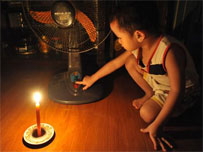
Vietnam to raise power prices from July 1 after inflation slows

Vietnam will raise electricity prices by 5 percent from July 1 after inflation slowed and as the country seeks to meet growing power demand.
Power tariffs will rise to an average VND1,369 (7 cents) a kilowatt-hour from VND1,304 currently, Hoang Quoc Vuong, deputy minister of industry and trade, said Friday in a telephone interview. The increase follows a 5 percent gain in December.
Vietnam Electricity, the state-owned utility known as EVN, is allowed to raise power prices every three months based on factors including changes in fuel costs or exchange rates, according to regulations which became effective in June last year. Higher prices could help improve finances at the company, which lost VND23.5 trillion in 2010 from electricity generation and exchange-rate movements, according to finance minister Vuong Dinh Hue, and which often sells power at below the cost of supply.
“If the tariff doesn’t go up it’s difficult for EVN to catch up with losses,” Anthony J. Jude, the director of the energy division at the Asian Development Bank’s Southeast Asia department said before the announcement. “It’s important for them to have the cashflow to invest in new generation.”
Vietnam estimates it will spend VND929.7 trillion to boost its electricity generation capacity by 2020 to meet domestic demand, Pham Manh Thang, head of the energy division at the Ministry of Industry and Trade, told reporters at a briefing in Hanoi in August.
First nuclear
The country will seek to raise capacity to 75,000 megawatts by 2020, according to the seventh electricity master plan, approved by the prime minister last year. The country intends to import and produce between 194 billion and 210 billion kilowatt- hours of electricity in 2015, according to the plan. Production and imports will rise to between 330 billion and 362 billion kilowatt-hours in 2020, the same year the country is targeting the inauguration of its first nuclear power plant.
Increasing generation capacity may be necessary to help Vietnam retain its position as an attractive destination for foreign investment. Electricity shortages are among weaknesses Vietnam faces in attracting foreign investment, Minister of Planning and Investment Bui Quang Vinh said March 15.
“Vietnam’s competitiveness is under threat because power generation has not kept pace with demand,” the World Bank said in its 2012 Vietnam Development Report. Pledged foreign direct investment in Vietnam was $6.38 billion in the first half of 2012, down 28 percent from the same period a year earlier, the Foreign Investment Agency of the Ministry of Planning and Investment said June 26.
Inflation impact
The electricity tariff adjustment may help check a deceleration in inflation and create higher costs for businesses amid a slowdown in economic growth. Consumer prices rose 6.9 percent from a year earlier in June, the slowest since December 2009. Vietnam’s economy expanded 4.66 percent in the second quarter from a year earlier, after climbing 4 percent in the first three months of 2012, according to General Statistics Office data.
“Of course it will add to inflationary pressures, and companies and households will complain, but they have to do it,” said Nguyen Xuan Thanh, an economist with the Vietnam Program at the Harvard Kennedy School, said by telephone from Ho Chi Minh City before the announcement. “The longer the wait, the more difficult it will be for the government to raise prices in the future.”
Bloomber
Read more :
- Honda Develops All-new General Purpose Engines for Emerging Markets
- Vietnam is world's 22nd fastest growing economy
- Vietnam opens first wind turbine power factory
- Japan agrees to help Vietnam develop nuclear power plants


 Homepage
Homepage
